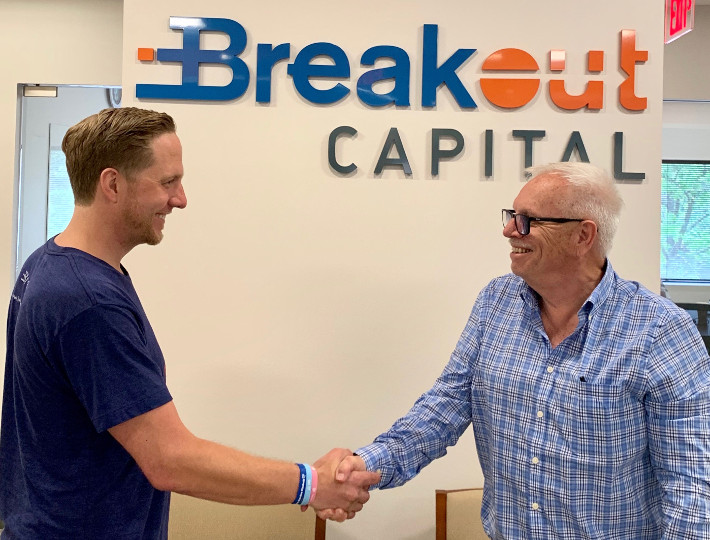Archive for 2019
CAN Capital Welcomes John McNeill, New Chief Financial Officer
July 23, 2019 Kennesaw, GA — CAN Capital, a leading provider of small business working capital loans, is pleased to announce the hiring of John McNeill as its new Chief Financial Officer (CFO). McNeill brings to the company a deep expertise in corporate finance, accounting, treasury and a growth orientation well suited for CAN’s current expansion.
Kennesaw, GA — CAN Capital, a leading provider of small business working capital loans, is pleased to announce the hiring of John McNeill as its new Chief Financial Officer (CFO). McNeill brings to the company a deep expertise in corporate finance, accounting, treasury and a growth orientation well suited for CAN’s current expansion.
McNeill has been a mainstay in the Atlanta financial services industry. He joins CAN from Ocwen Financial Corporation where he served as Senior Vice President of Servicing Finance, Treasury and Investor Relations. Before that, he served as Vice President of Finance and Treasurer at Home Loan Servicing Solutions, and has also worked in various financial capacities at WestRock and KPMG. He earned his undergraduate degree at the University of Georgia, his MBA at the Goizueta Business School at Emory University, and is a CPA and CFA Charterholder.
“I am very excited to be joining the team and having the opportunity to help the company build on its recent momentum and, ultimately, capitalize on its growth potential,” said McNeill. “I admire CAN Capital’s long history of providing much needed capital to small businesses and look forward to working with our customers, partners, and team during the next chapter of its business expansion.”
CEO Edward J. Siciliano spoke about McNeill’s role in CAN’s promising future: “I’m excited to work with John and benefit from his experience as we establish CAN as the market leader in small business lending on a national scope” Siciliano added, “John’s the perfect fit to drive our corporate finance activities in the upcoming expansion years.”
The entire CAN Capital team welcomes John, who, along with our dedicated group of CAN Capital team members, is here to support our mission of helping every small business succeed.
CAN Capital Hired a New CFO: Here’s His Take On The Company
July 23, 2019 The last 12 months have seen plenty of developments within the offices of CAN Capital. September witnessed the announcement of a new credit facility of $287 million with Varadero Capital. January brought news of the hiring of a new CEO. And now, completing the hat trick is CAN’s employment of John McNeill as its CFO.
The last 12 months have seen plenty of developments within the offices of CAN Capital. September witnessed the announcement of a new credit facility of $287 million with Varadero Capital. January brought news of the hiring of a new CEO. And now, completing the hat trick is CAN’s employment of John McNeill as its CFO.
Coming from years of experience in finance, with firms such as Ocwen Financial and Zume, McNeill is stepping into his role with an optimism normally reserved for those at the offset of a new business. Saying that due to recent restructuring, new hirings, and CAN’s re-evaluation of its position in the market over the previous two years, McNeill believes that the company “feels like it’s a nimble startup.” Albeit a startup that has been in the industry for over 20 years.
Founded in 1998 by a small business owner who struggled to be approved for a business loan, CAN has been cemented as a legacy figure within the alternative finance industry. Having persevered through the ’08 crash as well as other economic hiccups over the past two decades, CAN is uniquely positioned in that it has 20 years worth of experience and data, not to mention the personnel who have stuck around to become veterans as well, to guide them through the current moment of market saturation.
And it is the synergy between these two aspects of CAN, the new and the old, that initially drew McNeill to the company. The opportunity to work alongside people who have decades of experience in the market, as well as those who have only been there a few months longer than himself, led McNeill to view CAN as an anomaly, where it’s “like being the new guy, but with all of the tools of historical experience.”
This freshness tempered by lessons learned in the past is also attributed by McNeill to CAN’s CEO, Edward J. Siciliano, who’s worked in commercial financing, sales, marketing, and operations for over 30 years; and who has aimed to expand operations, both technologically and geographically, since his taking up of the role.
McNeill believes that there continues to be plenty of the market left to expand into, saying there’s “still a lot of opportunities to make money and to help secure funding for businesses across America.”
Loan Broker Busted In Advance Fee Loan Scam Faces Drug Charges
July 20, 2019Demetrios Boudourakis, who was arrested last month for operating an advance fee loan scheme that allegedly defrauded small business owners nationwide, is also facing federal drug charges. The criminal complaint, filed on June 14th, asks for an arrest warrant for conspiring to distribute controlled substances.
“Try Being Bored”: Amanda Parker’s Ascent To Top FinTech Recognition
July 19, 2019 “Fantastic and surprising” is how Amanda Parker, the Director of Innovation at FundThrough, described being selected as one of Canada’s Top 50 Women in FinTech last week. The list, produced by the Digital Finance Institute, aims to highlight those women whose contributions to and leadership in the FinTech industry have been influential.
“Fantastic and surprising” is how Amanda Parker, the Director of Innovation at FundThrough, described being selected as one of Canada’s Top 50 Women in FinTech last week. The list, produced by the Digital Finance Institute, aims to highlight those women whose contributions to and leadership in the FinTech industry have been influential.
Among those who Parker shares the honor with are executives from Mastercard, Google, RBC, and Scotiabank. Covering a wide range of the industry, it appears that Parker is in good company, and she herself says that it’s dizzying seeing her name among those of women whose work she has admired for years.
Parker earned her place on the list after having served as the Innovator and Entrepreneur in Residence at the Ryerson Digital Media Zone, an early-stage incubator for Canadian tech startups; founded and sold two venture-backed startups, CT Media and SimplyInsight; and worked in a number of positions at FinTech firms. The last of these feats saw her as the VP of Business Development and Partnership at Zoom.ai as well as an Advisor at Robin Concierge.
 If you think this sounds like a lot for one person to have done before even being a decade out of college, you’d be correct. Parker is a self-confessed overworker. Upon deciding to take a break from employment after her colleagues and investors told her to “try being bored for a while,” she managed to become newly employed after four weeks. A chance meeting with Deepak Ramachandran, FundThrough’s CTO, at a trade conference resulted in her landing her current role.
If you think this sounds like a lot for one person to have done before even being a decade out of college, you’d be correct. Parker is a self-confessed overworker. Upon deciding to take a break from employment after her colleagues and investors told her to “try being bored for a while,” she managed to become newly employed after four weeks. A chance meeting with Deepak Ramachandran, FundThrough’s CTO, at a trade conference resulted in her landing her current role.
Being an alternative finance company that deals exclusively in factoring, Parker’s role entails her foreseeing issues before they become problems. Saying that the job is like “developing a startup within a startup,” it seems like she’s in her element. With her experiences in the startup field coming to fruition at a company that’s been established for just under five years, Parker is enjoying herself, especially as she feels a connection to the service FundThrough provides, with the memory of needing to quickly receive payments being a holdover from her entrepreneur days.
Based in Toronto, FundThrough’s offices are a return to home for Parker, who had lived amongst the techies in San Francisco previously. Explaining the she felt the technology hub had been hampered by the housing market, she views Toronto as a perfect place for tech startups. “It’s been a known secret for a while that there’s tech talent in Toronto,” she noted before going on to talk about how new companies are just starting to take advantage of this by setting up shop in the city. A trend that is likely to also be bolstered by the relatively low rent and unsaturated labor force Toronto has.
“Now you don’t have to be in San Francisco to have a great job at a great company,” you might find one at home, just as Parker has.
Is The COJ Law In Effect Yet?
July 18, 2019
The COJ bill passed, but where’s the governor’s signature?
When the legislature passes a bill in New York State, there’s a documented procedure on the Senate’s website for how it becomes law. If the legislature is still in session, the governor has only 10 days to sign it. If the passed bill is sent to the governor when the legislature is out of session, the governor has 30 days to sign it.
Caught in this process is S6395, the now-infamous COJ bill that prohibits the filing of a COJ in New York State against a non-New York resident. Its passage on the 18th of June and the closing of the legislative session theoretically put the bill on the 30-day track for the governor’s signature.
Indeed, the Farm Laborers Fair Labor Practices Act, which was debated on the Senate floor for several hours during the closing few days, has already been signed. So too have other bills, but not the COJ bill whose deadline for a signature was perceived to be around now.
But such deadlines are a bit more fluid in practice, legislative insiders say. The act of “delivering” the bill to the governor is a step all on its own and the legislature can actually withhold its formal delivery to avoid setting the clock in motion.
According to an official who’s familiar with the process, it could be months before the dotted line is signed. The official, who asked not to be named, explained that upon the bill being delivered to the governor’s office, only then will Governor Andrew Cuomo have 10 days to sign it. The legislature can also technically withhold delivery up until the very end of the year. This, the official explained, is done to ensure that legislation is thoroughly vetted, with extra checks to guarantee that bills are not unconstitutional and that they’ll lead to no previously unforeseen consequences.
Cuomo has already signed a bill allowing Congress to access Trump’s state tax returns, a bill raising the tobacco & e-cig buying age to 21, a bill guaranteeing women equal pay, and many more. All of which means the COJ bill could be next at any moment or it could be sentenced to signature purgatory until the last business day of 2019.
As the public waits with bated breath, small business finance companies are already planning next steps. Ian Nadjari, the Managing Director of Riverstrong Capital Funding, who said that his office was “not feeling good about [the bill],” is planning to drop their use of COJs entirely and update the terms of their future contracts. Nadjari aims to continue business regardless of the impending changes, he said.
Uplyft Capital CEO Michael Massa, explained that the bill is just a “change that we’ll have to adapt to. Certain players will be okay if they understand how COJs work.”
Several small business funding CEOs explained to deBanked that they welcome S6395 with the belief that it will level the playing field. One asserted that it will “eliminate some of the bad practices in the market,” such as the “offensive, aggressive measures” taken by firms who filed COJs too quickly or potentially in bad faith.
That perception, that such practices are not only possible, but have occurred, has garnered attention far beyond New York State. On June 26, for example, several members of Congress held a hearing to discuss COJs and their impact to further support for a federal bill that would ban them from use nationwide. That bill has a quite a bit a ways to go before it ever potentially even comes up for a floor vote.
SecurCapital Acquires Breakout Capital Finance’s Lending Business
July 17, 2019Supply chain and logistics company acquires the lending business of leading fintech small business lender and injects new equity capital
MCLEAN, VA — SecurCapital Corp, an expanding supply chain and financial services provider headquartered in California, today announced the acquisition of the lending business of Breakout Capital Finance, a leading fintech company and nationwide small business lender. SecurCapital is also providing additional equity capital to drive growth in Breakout Capital Finance’s two primary lending products: its highly regarded and innovative term loan product and its FactorAdvantage ® lending solution for small businesses that utilize factoring to finance their business. The acquired lending business assets will be operated by a subsidiary of SecurCapital that will conduct business as Breakout Capital.
Steve Russell, CEO of SecurCapital commented, “We’re delighted to have found a highly respected team and innovative business model in the small business finance space. I share the founder’s vision of the massive potential of the FactorAdvantage lending solution and believe we now have the platform and capital to rapidly grow this industry-changing product. We couldn’t have found a better business to complement SecurCapital’s strategic vision for empowering small businesses.” SecurCapital, through a series of strategic acquisitions, provides supply chain and financial services to small businesses primarily in the logistics industry, including veteran-and minority owned businesses.
Breakout Capital Finance’s Founder, Carl Fairbank added, “After four years as Founder and CEO of Breakout Capital Finance, this transaction begins the next chapter of Breakout Capital’s lending business. SecurCapital is also committed to the proliferation of best practices to drive change in the broader market. I believe Breakout Capital, in partnership with SecurCapital, is now well positioned for substantial growth, especially with its commitment to FactorAdvantage.” Mr. Fairbank will provide strategic guidance during the transition, but has stepped down as CEO of the lending business to focus on driving innovation in advanced technology, including artificial intelligence, machine learning, and blockchain.
Tim Buzby has been appointed as the new CEO of Breakout Capital. He spent 17 years at Farmer Mac, in executive positions culminating as CEO. Notably, he oversaw a 58% increase in company earnings and an almost 4x increase in stock price and strategically matured the company into an agricultural lending industry leader.
Breakout Capital has also hired McLean Wilson, former CEO of Charleston Capital, an asset manager in the SME space, and former CEO of inFactor, a factoring company, as Chief Credit Officer. Mr. Russell added, “With the appointment of Tim as CEO and the addition of McLean to the management team, we expect Breakout Capital not only to carry forward its role in the industry as product innovator and transparent lender but also to deliver financing solutions to a much broader range of small businesses.” Breakout Capital is committed to maintain the high ethical standards, best practices, APR-based disclosure, and competitive pricing for which it has always been known.
About Breakout Capital
Breakout Capital, headquartered in McLean, Virginia, has been and will continue to be a leading fintech company, offering innovative small business lending solutions across the country. As part of SecurCapital, Breakout Capital will remain committed to transparent and responsible lending solutions through product innovation, small business borrowing education, and advocacy against predatory lending practices and will continue to empower small business through right-sized lending, suitability testing, improving terms and supporting the long-term financing objectives of small businesses. Breakout Capital has been widely regarded as the “white-hat” lender in the alternative finance space and intends to retain that reputation as part of SecurCapital.
FOR ADDITIONAL INFORMATION:
Breakout Capital www.breakoutfinance.com
CONTACT:
Public Relations and Media Contact:
Phone: 703.852.6142
Email: info@breakoutfinance.com

About SecurCapital
SecurCapital is headquartered in greater Los Angeles, California with locations in San Diego, Atlanta, Baltimore and Washington, DC. SecurCapital provides supply chain financial services and proven advisory services to logistics businesses from a seasoned team of logistics and financing professionals. SecurCapital offers mid-tier and startup companies access to working capital, M&A consulting, technology enablement and mission critical services for all their supply chain needs. SecurCapital offers forwarders, truckers, custom brokers, 3PL, wholesalers, 4PL, suppliers, veteran owned small businesses (VOSB), minority owned enterprises and government contractors’ on-line access to a broad range of services.
Forward-Looking Statements Disclaimer: This press release contains forward-looking statements within the meaning of Section 27A of the Securities Act of 1933, as amended, and Section 21E of the Securities Exchange Act of 1934, as amended. In some cases, you can identify forward-looking statements by the following words: “anticipate,” “believe,” “continue,” “could,” “estimate,” “expect,” “intend,” “may,” “ongoing,” “plan,” “potential,” “predict,” “project,” “should,” “will,” “would,” or the negative of these terms or other comparable terminology, although not all forward-looking statements contain these words. Forward-looking statements are not a guarantee of future performance or results and will not necessarily be accurate indications of the times at, or by, which such performance or results will be achieved. Forward-looking statements are based on information available at the time the statements are made and involve known and unknown risks, uncertainty and other factors that may cause our results, levels of activity, performance or achievements to be materially different from the information expressed or implied by the forward-looking statements in this press release.
FOR ADDITIONAL INFORMATION:
SecurCapital Corp www.securcapital.com
CONTACT:
Public Relations and Media Contact:
Phone: 619-384-3359
Email: info@securcapital.com

Breakout Capital is BACK
July 17, 2019
SecurCapital Corp has acquired the lending business of Breakout Capital Finance.
Breakout was founded in 2015 by Carl Fairbank, a former investment banker, and quickly made a splash in the burgeoning small business lending industry. The company has raised significant capital and is a principal member of Innovative Lending Platform Association (ILPA), a trade group that among other things, created SMART Box, a uniform loan disclosure meant to enhance transparency across the industry.
Earlier this year, however, the company suspended originations.
But that’s poised to change. The deal with SecurCapital, a supply chain and financial service provider headquartered in California, means that Breakout is on track to resume originations as early as next week, according to the company. And there’s other changes afoot.
Tim Buzby, who previously served as the company’s CFO is now the President & CEO. Buzby is well primed for the job. He’s a former CEO of Farmer Mac, a company he spent 17 years with.
Carl Fairbank, who previously served as CEO of the lending business, will provide strategic guidance during the transition, the company reports. He will no longer have a day-to-day role.
“After four years as Founder and CEO of Breakout Capital Finance, this transaction begins the next chapter of Breakout Capital’s lending business,” Fairbank is quoted as saying in a company announcement. “SecurCapital is also committed to the proliferation of best practices to drive change in the broader market. I believe Breakout Capital, in partnership with SecurCapital, is now well positioned for substantial growth, especially with its commitment to FactorAdvantage.”
Fairbank is reportedly shifting his focus toward driving innovation in artificial intelligence, machine learning, and blockchain.
Breakout Capital has also hired McLean Wilson, former CEO of Charleston Capital (fka Drift Capital Partners), an asset manager in the SME space, and former CEO of inFactor, a factoring company, as Chief Credit Officer.
In an interview with Breakout’s new CEO Tim Buzby and VP Jay Bhatt (who has been with the company since the very beginning), they said that the company’s risk criteria and credit box will remain the same as it was previously, with potential to even expand it down the road. The company pressing the originations pause button from approximately February to July, therefore, shouldn’t be interpreted as a weakness of the company’s business model. Rather the acquisition and changes should suggest the opposite.
Steve Russell, CEO of SecurCapital, commented, “We’re delighted to have found a highly respected team and innovative business model in the small business finance space. I share the founder’s vision of the massive potential of the FactorAdvantage lending solution and believe we now have the platform and capital to rapidly grow this industry-changing product. We couldn’t have found a better business to complement SecurCapital’s strategic vision for empowering small businesses.”
Two SecurCapital executives have also been placed on Breakout’s board of directors.
Buzby confirmed that operations will resume as normal. The business address and business name will remain the same with one notable difference; That being that the name has been shortened from Breakout Capital Finance to Breakout Capital. It’s also now being operated by a subsidiary of SecurCapital.
Key Takeaways from the Q2 2019 Private Capital Access Index
July 17, 2019The latest Private Capital Access Index, published quarterly by Pepperdine Graziado Business School, was released recently, and with it came fresh insights into the minds of business owners. Covering companies that earn under $5 million in revenue annually, as well as those that raise between $5-100 million, the Index provides information on a wide range of business. Below are snapshots of some of the main points found within the report:
More Large Businesses Appear to be Looking for More Money
Businesses that earn between $5-100 million a year are seeking to raise more financing in 2019. Compared to 2018, many loan ranges have seen jumps: the amount of larger businesses seeking between $500,000-999,999 has over doubled in size to 39% and $1-1.999 million has more than tripled to 28%. However, outside of this range, desire has fallen for financing among larger firms.
Slight Fluctuations in How Quickly Customers Are Paying
The past year has witnessed some small changes in the speed at which businesses receive payments from their customers. With 15% of smaller businesses reporting accelerated reception of payments in the previous three months, an increase from the 11% that was stated this time last year, and an increase of 1% of larger businesses claiming a speed up, it seems at least that a small sector of fortunate vendors are benefitting from increasingly prompt customers.
Accompanying these figures are the reports of payments slowing down, that show a 2% increase amongst smaller companies and a drop to 10% from 23% for their larger counterparts. This jump is accounted for by the 81% of larger businesses which reported that the speed of payments remained the same, which is up from 70%; while the smaller firms reported 63%, down from 68% in 2018.
More Businesses Are Planning to Raise Finance
More businesses of all sizes are looking to raise capital in the coming six months compared to 2018, with 35% of small businesses and 28% of larger businesses claiming that they will be seeking financing, an increase of 5% for both. This news, coupled with the knowledge that the total number of businesses which said they will not be seeking finance dropped, may come as a gift to lenders and brokers, but it should be taken with a pinch of salt, as those who said they were unsure also rose by 4% to 35%.
Purposes for Raising Finance Remain Mostly Unchanged
Growth and expansion continue to be the primary reason for seeking finance, with an increase on last year from 58% for both the smaller and larger companies to 62% and 77%, respectively. As well as this, working capital fluctuations and refinancing existing loans/equity remain as the second and third highest reasons to raise funds, with the total of the former dropping 3% to 17% and the latter falling to 7% from 10%. Besides these motives, capital required to replace equipment or facilities unrelated to expansion saw a dip of 4% in larger businesses.
Businesses Are Optimistic
Despite over 50% of businesses saying that it is difficult to acquire both equity and debt finance, as well as 49% claiming that the current business financing environment restricts growth opportunities, businesses appear to be confident about the future, with 68% of them expecting increases in revenue over the next year. Also, respondents appear to be unconcerned by external forces, as 57% of businesses don’t believe the federal tax hike will impact them and 74% don’t expect to be hampered by severe weather from climate change. These may or may not prove to be naïve as time goes on, especially the latter, as 56% of the respondents do not have emergency funds in place should severe weather disrupt their business, but for now companies seem to be looking forward to the coming year.
The full report is available here.





























